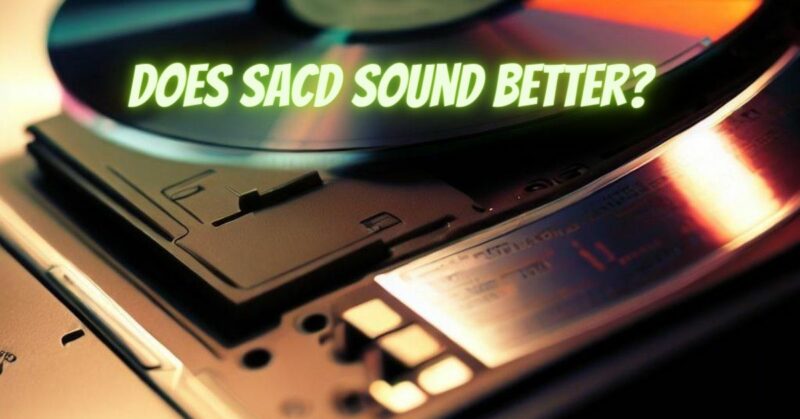In the quest for audio perfection, enthusiasts are continually on the lookout for formats that deliver the purest and most immersive sound experience. Super Audio CD (SACD) has emerged as a contender, promising high-resolution audio and exceptional sonic fidelity. The question at the heart of the debate is: Does SACD sound better? This article delves into the characteristics of SACD, its unique qualities, and the factors that contribute to its reputation as a superior audio format.
The Advantages of SACD: A Sonic Showcase
SACD sets itself apart with several key features that contribute to its reputation for superior sound quality:
- High Resolution: SACD employs the Direct Stream Digital (DSD) encoding method, allowing for a higher sampling rate and greater bit depth than standard CDs. This high-resolution format captures a more detailed and accurate representation of the original recording.
- Dynamic Range: The increased bit depth and dynamic range of SACD result in greater audio precision. Soft passages retain clarity, while loud sections maintain their impact without distortion.
- Low Noise: The digital nature of SACD reduces the noise and interference that can affect analog formats, ensuring a cleaner and more transparent sound.
- Multi-Channel Audio: SACD offers the option of multi-channel audio, allowing for immersive surround sound experiences that envelop the listener.
- DSD Encoding: SACD’s use of DSD encoding captures audio in a continuous stream of single-bit values, resembling the continuous waveforms of analog audio. This method is believed by many to retain more of the original musical nuances.
Factors Influencing Sound Quality:
While SACD offers technical advantages, the ultimate sound quality is influenced by various factors:
- Recording Quality: The quality of the original recording and mastering process greatly impacts the final sound quality on SACD.
- Playback Equipment: The quality of your SACD player, amplifier, speakers, and even your listening room’s acoustics can significantly affect how SACD sounds.
- Personal Preference: Sound preference is subjective. Some listeners may prefer the pristine clarity and detail offered by SACD, while others might gravitate towards the inherent warmth and character of analog formats like vinyl.
Comparison with Other Formats:
When comparing SACD to other audio formats, such as standard CDs or vinyl, it’s essential to consider the inherent characteristics of each format:
- SACD vs. CD: SACD’s high resolution and dynamic range typically exceed those of standard CDs, resulting in a potentially more detailed and accurate listening experience.
- SACD vs. Vinyl: SACD offers digital precision, while vinyl provides analog warmth and character. The choice between the two depends on personal preferences and the desired sonic attributes.
The question of whether SACD sounds better is subjective and nuanced. SACD’s technical advantages, high resolution, dynamic range, and low noise contribute to a superior sonic experience for many listeners. However, individual preferences, playback equipment, and the nature of the music being played all play a role in shaping the final sonic impression. Ultimately, embracing SACD as a unique musical journey allows you to explore the artistry of sound reproduction and immerse yourself in the symphony of sonic possibilities that the format offers.


